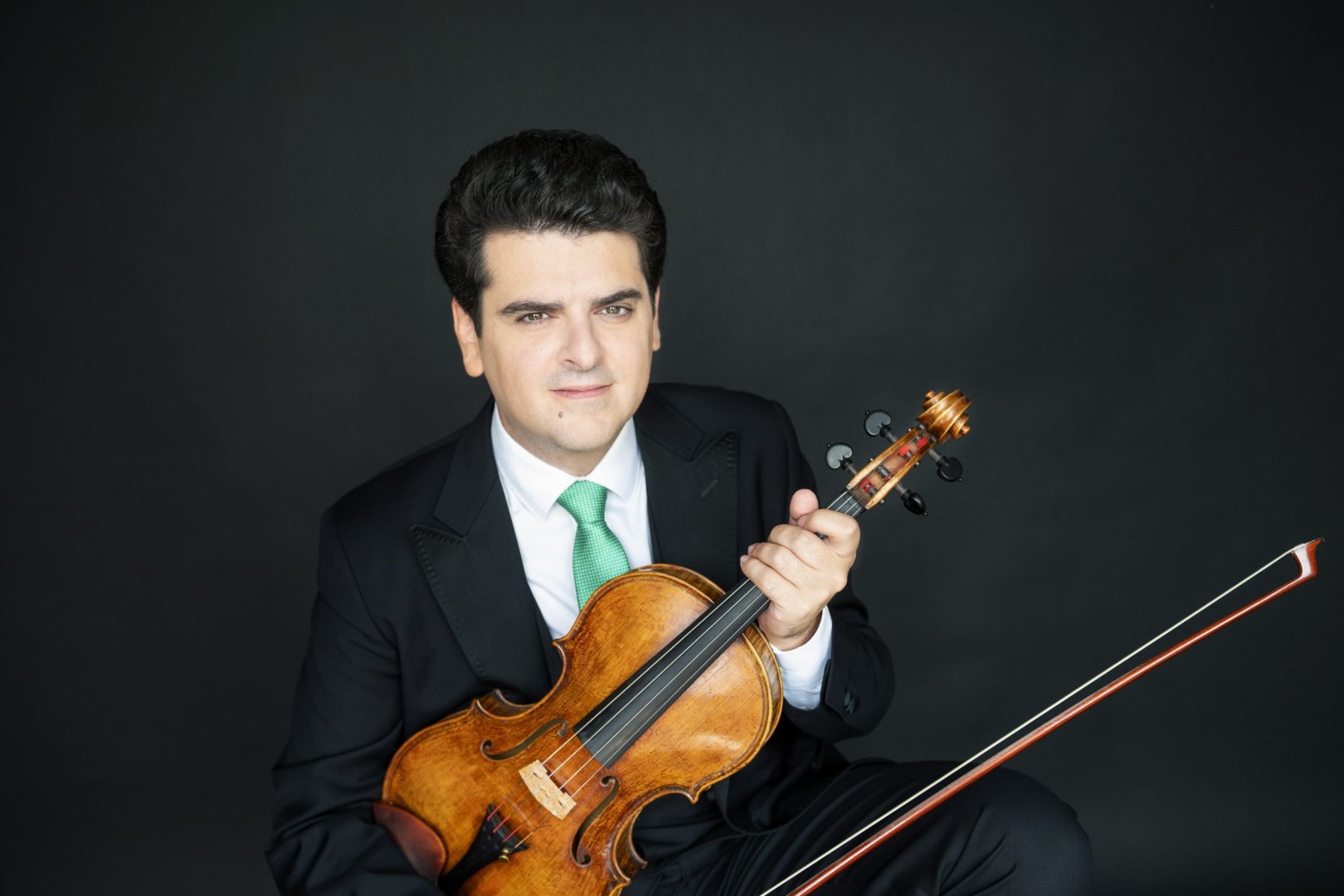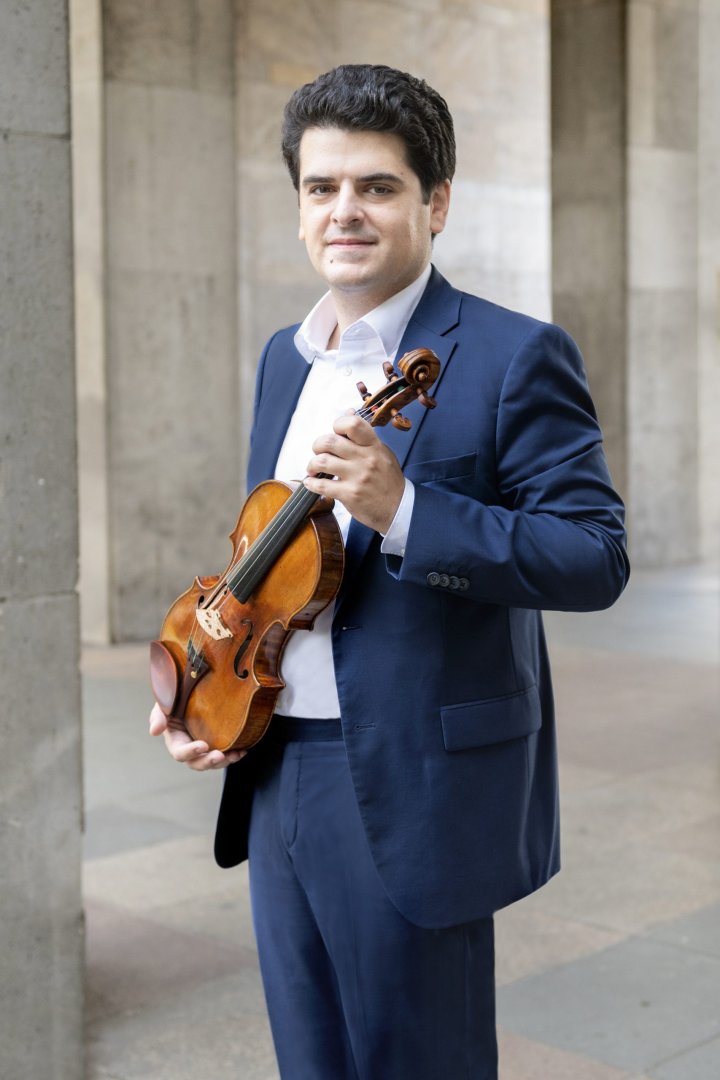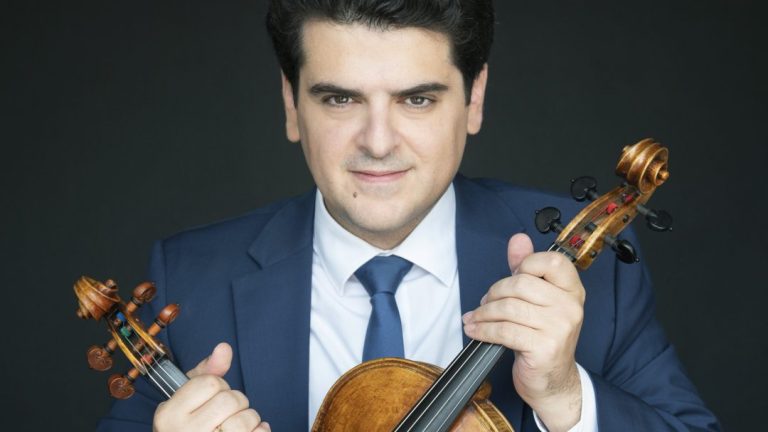On 3 November, an octet of string players from the famed West-Eastern Divan Orchestra will grace the halls of Budapest’s Hungarian House of Music. Their concert, with a variety of scores new and old, will illustrate exactly what their Berlin-based organization is all about: helping the world conquer prejudice and intolerance through the magic of making great music together.
The ensemble’s leader and founder is violinist Michael Barenboim, the son of pianist/conductor Daniel Barenboim. This appearance will be Michael’s third in Budapest, after two different concerts here in the recent past, the latter one being with his father at the keyboard. This time, he is bringing his estimable string colleagues, who will perform the music of Schubert, Mendelssohn, and a specially commissioned piece by Benjamin Attahir. Joining them for this performance will be Hungarian pianist József Balog.
This ensemble is the natural offshoot of the West-Eastern Divan Orchestra, an organization founded in 1999 by Daniel Barenboim and the late Palestinian scholar Edward W. Said. (They also annexed a music conservatory, the Berlin Said Academy.) Their initial concept was to create an ensemble that combined Israeli and Palestinian musicians who would inherently become cultural ambassadors for peace as they performed around the world.
In an interview with Papageno, Michael, who not only is the concertmaster of the Divan Orchestra but also enjoys a global solo career, explains much more about the octet’s 2022 European tour, and why this one evening in Budapest is not to be missed.
– Is the octet you’re bringing to Budapest a separate permanent group, or are they players exclusively from the West-Eastern Divan Orchestra?
– According to what we are going to play, we can change the instrumentation and the formation. In this case, we have an octet with two of each stringed instrument. We toured the US in 2020, and already two or three musicians are not the same, so it’s starting to rotate slightly. We will tour the US again in Feb/March ’23, and after that we’ll probably go with another formation – with winds and strings, just because the repertoire will change. Now, for Budapest, in addition to the Mendelssohn string octet, we will perform a new string quartet by Attahir: “Jawb” (meaning “crossing”). So, next time it might be a different (like strings and winds) octet or a smaller group. And then it might be different people, too.
– Tell us about Attahir’s piece…
– He wrote it for us, for the US tour in 2020. It’s a very typical piece for him – it’s very vibrant and lively, energetic, and at the same time it has its complexities: internal structural things that are very interesting. I’ve played music of his before and I think it’s great. He’s Franco-Lebanese with either Moroccan or Algerian roots as well. He also wrote a piece for me and my father during the height of the pandemic.
– What things changed within the organization as a result of two years of covid shutdowns?
– What I can tell you is the orchestra, funnily enough, managed to perform! In the summer of 2020, when there was full-on lockdown and things seemed impossible, Salzburg Festival did have a festival. They managed the festival with 50 percent capacity, with masks and so on, and we played there with a small orchestra. We played Wagner’s Siegfried Idyll and Beethoven’s Grosse Fugue. We also played that program in the Boulez Saal in Berlin with [purposely] very few people in the audience.

The orchestra’s US tour that I was speaking of, happened just before the lockdowns. When we came back from the US, the lockdowns started three days later. In most venues where we played, we were the last act. Then in the summer of ’21, we had a proper tour lined up, though in some places the capacity was reduced, or they asked us to play twice, like in Hamburg’s Elbphilharmonie. In 2021, the orchestra had two programs – one where I played the Brahms double with cellist Kian Soltani, and another one was conducted by Lahav Shani in which my father played Brahms’s second piano concerto. We had to play those programs twice in one day. A lot of other places asked people to play twice. By May and in summer, things were more or less [normalized].
The octet that was meant to come to Budapest was planned to tour in Europe in early 2021, but we had to cancel that because the dates kept going away, and then there comes a point where it doesn’t make much sense to assemble eight people just to play twice – and might be canceled. So, we decided in early March to be reasonable and move it to the Fall. That period in the Fall of ’21 also didn’t happen! But we did play in Berlin, in the Boulez Saal, so that was a kind of European debut. Now, we are really properly touring for ten days. We’re here in Europe now, and in the US in the Spring, and next year we’ll have different projects.
– Were there other creative solutions during that difficult period?
– I’m also Professor and Dean and the Berlin Said Academy, which of course comes from the Divan Orchestra, and with the same theme and ideals. During that time it was a constant back-and-forth that we were allowed to do, especially in terms of group music – chamber music, orchestra, etc. We had to cancel quite a few things, but we always managed to keep it going. That was important for me personally, but for all of us, despite very strict rules on gatherings. Without breaking the rules, we still managed to have some form of chamber music. To compensate for that, we created a Chamber Music Workshop where the students had one intensive week of chamber music rehearsals and a concert in the Boulez Saal. It was a great success so we kept that workshop–plus–concert structure again for a second time, and still all voluntary. One person said to us ‘the moment something happens for a second time, it’s already a tradition,’ so we’re going to keep that program going.
The main message here is that we never really stopped—of course, we had to work ten times harder to make this happen. Playing two or three concerts like the ones we did in 2021 took much more effort from everyone than playing ten concerts any other year. Making plans for chamber music at the Said Academy for one week was ten times more headache than any other time. I would say we did the right thing by not saying ‘let’s just leave it and take it up when it’s possible again’ because that means it might not work. We wanted to keep our messaging alive.
– Did you grow up in this orchestra before you launched into your solo career?
– You could say that. I joined it when I was 14. And when I did that, I also met the person who was going to be my long-time violin teacher there (Axel Wilczok), because he coached the first violin section in those early years. He was the concertmaster of the Staatskapelle Orchestra; sadly, he passed away a few years ago. Also, of course there was the kind of musical education that I enjoyed – that we all enjoyed — in those early years, and [at the same time] being in contact with my father. But even if it hadn’t been my father, it was still a very enriching musical and humanistic experience. I think I can speak for all of my colleagues in this regard.
The whole West-Eastern Divan idea of living with music, but also having an education in other subjects like philosophy, history, and literature — what we do at the academy – I think that kind of blend is very important.
– What countries are represented in the West-East Divan Ensemble octet, and do they live in different locations around the world?
In this formation, we have players from Lebanon, Syria, Israel, and Palestine. It’s slightly different every time, but this group is actually a good showcase of what the orchestra represents.

Out of the eight, six members live in Berlin. The reason for that is that I’m there, and as I said, I’m Professor and Dean at the Barenboim-Said Academy, from which four of them are alumni. That leaves only two people who are not alumni or work at the Academy, so as you see, the Academy also, in that way, accomplished for us what we always wanted – to tour. As also a kind of orchestral academy [connected to] the Divan, it allowed us to bring forward people who could play in the orchestra as well as this ensemble.
– How does it feel to march into the future with this kind of huge legacy of what your father has created and still operates?
– It’s the question of how we keep transporting the message and keep playing, because every time we play also means we’re saying something. I think that’s very important that we keep going because the times are getting worse and worse everywhere around us, and the more opportunity we have to fight this ignorance, intolerance, and prejudice – every time we go onstage, basically, is a good thing. That being said, the most important thing to make that work, is artistic quality. If we don’t play well, it would all be for nothing and no one would take it seriously. In the end, the main thing is artistic quality. That will carry all the non-musical messaging that there is. We’re not politicians, we’re not historians, we’re musicians. We must fully represent that [goal of global harmony] in the best possible way on stage. That’s what we stand for.











